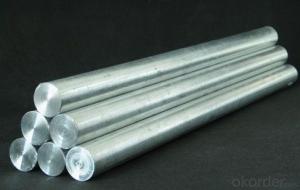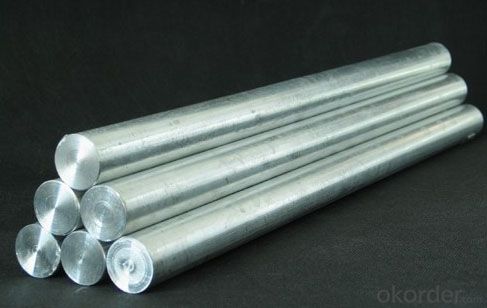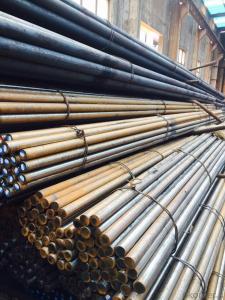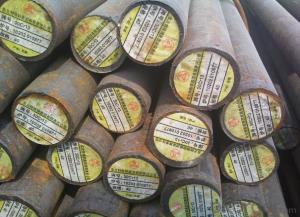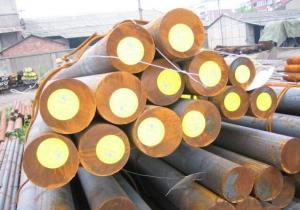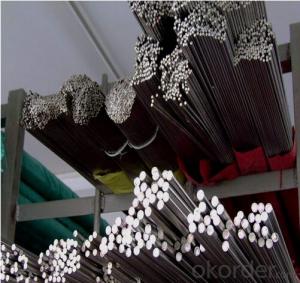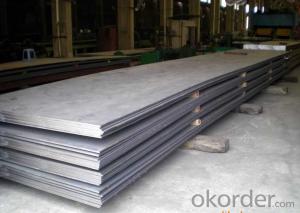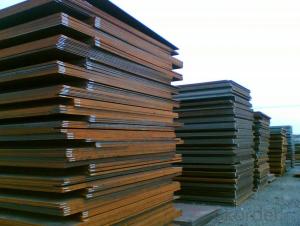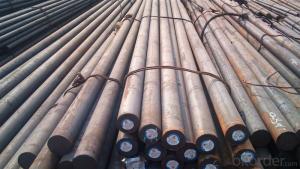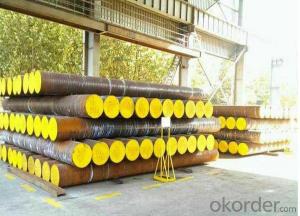CH1 Tool Steel Special Steel Carbon Steel
- Loading Port:
- China main port
- Payment Terms:
- TT OR LC
- Min Order Qty:
- 25 m.t.
- Supply Capability:
- 10000 m.t./month
OKorder Service Pledge
OKorder Financial Service
You Might Also Like
Specification
Chemical Composition(%)
| C | Si | Mn | Cr | Mo | V | S | P |
| 0.65-0.75 | 0.85-1.15 | 0.65-1.05 | 0.90-1.20 | 0.20-0.50 | 0.15-0.30 | ≤0.30 | ≤0.30 |
Available Size
| Forged flat steel | 20-280mm×400mm×L |
Heat Treatment
| Item | Temperature℃ | Hardness |
| Anneal | 840-860 | ≤235HB |
| Quenching | 840-1000 | 60-62HRC |
| Tempering | 180-200 | 58-62HRC |
Characterstics
| 1.High strengh and hardness | |||||
| 2.Good toughness and hardening ability with wide quenching range | |||||
| 3.Quench-hardening obtained by air cold with hardness of 58-62HRC |
Applications: Specially suitable for cold working dies with thick cross-section and less quenching deformatio,widely applied in assembled dies for large vehicles


1, Your advantages?
professional products inquiry, products knowledge train (for agents), smooth goods delivery, excellent customer solution proposale
2, Test & Certificate?
SGS test is available, customer inspection before shipping is welcome, third party inspection is no problem
3, Payment Terms?
30% TT as deposit and 70% before delivery.
Irrevocable L/C at sight.
4, Trading Terms?
EXW, FOB, CIF, FFR, CNF
6, After-sale Service?
We provides the services and support you need for every step of our cooperation. We're the business partner you can trust.
For any problem, please kindly contact us at any your convenient time.
We'll reply you in our first priority within 24 hours.
- Q: What are the disadvantages of using special steel?
- One of the main disadvantages of using special steel is its high cost. Special steel is typically more expensive to produce and purchase compared to regular steel. Additionally, the production process for special steel often requires specific techniques and equipment, which can further increase costs. Another disadvantage is the limited availability of special steel. It may not be readily accessible in all regions, leading to longer lead times and potential supply chain issues. Moreover, special steel may have lower formability and machinability compared to regular steel, making it more challenging to work with and shape as needed.
- Q: How does special steel contribute to the construction machinery industry?
- Special steel plays a crucial role in the construction machinery industry by providing high-strength and durable components. These components are essential for heavy-duty applications in construction machinery, such as excavators, bulldozers, cranes, and loaders. One of the key contributions of special steel to the construction machinery industry is its ability to withstand extreme stress and load-bearing requirements. Construction machinery often operates under severe conditions, including heavy loads, vibrations, and impacts. Special steel, with its excellent mechanical properties, can resist these conditions and maintain its structural integrity, ensuring the safety and reliability of the equipment. Moreover, special steel is often used in critical components of construction machinery, such as booms, buckets, tracks, and gears. These components are subjected to intense wear and tear due to constant use in harsh environments. Special steel, engineered with enhanced hardness and wear resistance, helps extend the lifespan of these components, reducing maintenance costs and downtime. Additionally, special steel provides superior corrosion resistance, which is vital for construction machinery used in humid or corrosive environments. By preventing rust and decay, special steel helps maintain the equipment's performance and longevity, ultimately increasing productivity and efficiency in construction projects. Furthermore, special steel enables the construction machinery industry to achieve innovative designs and advanced functionalities. Its versatility allows for the creation of complex shapes and precise tolerances, which are essential for optimizing the performance and efficiency of machinery. Special steel also enables the incorporation of advanced technologies, such as sensors and automation, enhancing the accuracy and productivity of construction equipment. In summary, special steel contributes significantly to the construction machinery industry through its ability to withstand extreme conditions, provide superior wear resistance and corrosion protection, and enable innovative designs. By utilizing special steel in the manufacturing process, construction machinery manufacturers can ensure the durability, safety, and efficiency of their equipment, ultimately benefiting the construction industry as a whole.
- Q: How does special steel perform in terms of creep resistance at elevated temperatures?
- Special steel has excellent creep resistance at elevated temperatures. Its unique composition and heat treatment processes enable it to maintain its strength and dimensional stability over prolonged periods of exposure to high temperatures. This makes special steel highly reliable and suitable for applications where resistance to creep deformation is crucial, such as in power generation plants, aerospace, and oil and gas industries.
- Q: What are the different methods of surface thermal spraying for special steel?
- There are several different methods of surface thermal spraying for special steel, including flame spraying, arc spraying, plasma spraying, and high-velocity oxy-fuel (HVOF) spraying. Each method involves heating and melting a coating material, which is then propelled onto the steel surface to form a protective layer. These methods offer varying levels of coating thickness, adhesion, and durability, depending on the specific requirements of the application.
- Q: What are the different methods of measuring the hardness of special steel?
- Measuring the hardness of special steel can be done using various methods. These methods can be divided into two main categories: destructive and non-destructive testing. 1. One widely used destructive testing method is the Rockwell Hardness Test. This method measures the depth of penetration of an indenter into the steel surface. It provides a hardness value based on the steel's resistance to indentation. The Rockwell hardness test is a simple and quick method that requires minimal sample preparation. 2. Another destructive testing method is the Brinell Hardness Test. This method involves applying a known load to a hardened steel ball and measuring the diameter of the resulting indentation on the steel surface. The hardness value is determined based on the ratio of the applied load to the surface area of the indentation. 3. The Vickers Hardness Test is a micro-indentation test that uses a diamond pyramid-shaped indenter. It measures the diagonal length of the indentation left on the steel surface and calculates the hardness value based on the applied load. 4. The Knoop Hardness Test, similar to the Vickers test, is a micro-indentation method using a diamond pyramid-shaped indenter. However, instead of measuring the diagonal length of the indentation, it measures the length of the long axis. This test is particularly useful for measuring the hardness of thin steel samples or steel coatings. 5. For non-destructive testing, the Ultrasonic Hardness Test analyzes the propagation of ultrasonic waves through the steel to determine its hardness. The hardness value is determined based on the correlation between the velocity of the waves and the steel's hardness. 6. The Magnetic Hardness Test is another non-destructive testing method that utilizes magnetic properties. It involves applying a magnetic field to the steel and measuring the magnetic response. The hardness value is determined based on the correlation between the magnetic response and the steel's hardness. It's important to consider that each method has its own advantages and limitations. The choice of method depends on factors such as the type of steel, required accuracy, sample size, and available equipment and expertise.
- Q: What are the main applications of special steel in the packaging industry?
- Special steel has a wide range of applications in the packaging industry, primarily due to its exceptional strength, durability, and corrosion resistance. It is commonly used in the manufacturing of packaging machinery, such as conveyor systems, filling machines, and cutting tools, ensuring efficient and precise operations. Additionally, special steel is often employed in the production of packaging materials, including cans, containers, and closures, providing enhanced protection and preservation of goods.
- Q: How does special steel perform in electrical applications?
- Special steel, known as electrical steel, is purposely created and produced to meet the specific needs of electrical applications. It displays outstanding magnetic properties, rendering it highly suitable for utilization in electrical machines and devices. A primary feature of special steel is its diminished electrical resistivity, enabling efficient current flow and minimizing energy losses in electrical circuits. This reduced resistivity is achieved through precise control of the steel's composition and microstructure. Moreover, special steel possesses a high magnetic permeability, allowing for easy magnetization and demagnetization. This characteristic is crucial for the effective functioning of electrical machines such as transformers, motors, and generators. Additionally, special steel exhibits low coercivity, making it susceptible to magnetization or demagnetization with relatively low levels of magnetic field strength. This attribute proves advantageous in applications requiring rapid and precise magnetic switching, like electric transformers. Furthermore, special steel demonstrates minimal hysteresis loss, which pertains to the dissipation of energy as heat during magnetization and demagnetization cycles. This quality guarantees minimal energy losses in electrical devices, ultimately improving overall efficiency. To summarize, special steel excels in electrical applications due to its low electrical resistivity, high magnetic permeability, low coercivity, and low hysteresis loss. These properties establish it as an ideal choice for a wide range of electrical machines and devices, enhancing their efficiency and reliability.
- Q: What are the different tooling grades of special steel?
- There are various tooling grades of special steel, each designed to fulfill specific requirements and applications. Some common tooling grades include high-speed steel (HSS), which is known for its excellent heat resistance and durability; carbide steel, which is extremely hard and suitable for cutting tools; and stainless steel, which offers corrosion resistance and is commonly used for precision tools. Other tooling grades may include alloy steel, tool steel, and die steel, among others, each tailored to different tooling needs.
- Q: What are the main applications of special steel in the oil and gas equipment?
- Special steel is widely used in the oil and gas equipment industry primarily for its exceptional strength, corrosion resistance, and ability to withstand high temperatures and pressure. It is extensively used in the production of drilling tools, pipelines, valves, and other critical components that are required to operate in harsh and demanding environments. The main applications of special steel in this industry include drill bits, wellhead equipment, subsea equipment, and offshore platforms, all of which rely on the superior properties of special steel to ensure safe and efficient operations in the oil and gas sector.
- Q: Can special steel be used in the manufacturing of sports equipment?
- Sports equipment can benefit from the use of special steel, which is a specific type of steel engineered to possess certain properties. These properties, including high strength, durability, corrosion and wear resistance, and the ability to withstand extreme conditions, make special steel suitable for various specialized applications. In the production of sports equipment, special steel can be utilized in different ways. For instance, it can be employed to create the shafts of golf clubs or tennis rackets. The high strength and stiffness of special steel are crucial for ensuring optimal performance in these items. Moreover, special steel can be used in the construction of bicycles, where its lightweight yet strong properties are highly desirable. Furthermore, special steel can be applied to manufacture accessories for sports equipment, such as hooks, buckles, or fasteners. These components often require high tensile strength and corrosion resistance, which can be provided by special steel. By using this type of steel, the longevity and reliability of the equipment can be ensured. In conclusion, special steel can be used in the manufacturing of sports equipment to enhance performance, durability, and overall quality. Its unique properties make it a suitable choice for improving various aspects of sports equipment.
Send your message to us
CH1 Tool Steel Special Steel Carbon Steel
- Loading Port:
- China main port
- Payment Terms:
- TT OR LC
- Min Order Qty:
- 25 m.t.
- Supply Capability:
- 10000 m.t./month
OKorder Service Pledge
OKorder Financial Service
Similar products
Hot products
Hot Searches
Related keywords
